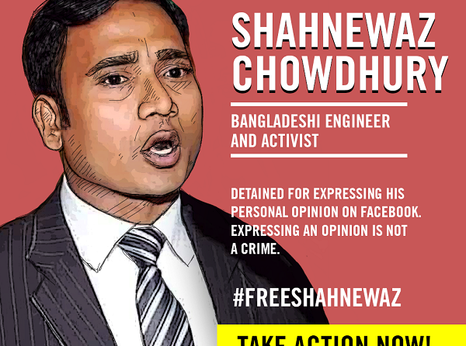Bangladesh: Engineer arrested for Facebook post

Shahnewaz Chowdhury, 37, was arrested from his Gandamara residence in Banshkhali, a sub-district in the southeast of Bangladesh, at 12:05am on 28 May 2021. Police lodged a case against him under the draconian Digital Security Act for a Facebook post where he shared his personal opinion that was critical about a power plant in his area.
In the Facebook post, he stated, “Breaking News: The people of Banshkhali thought that the environmentally destructive coal power plant, which became the cause of the killing of 12 people, would have set afloat the Gandamara Union in the tide of development. But in reality, Gandamara is drowning in the tidal surge. The youth of Banshkhali must resist injustice and support development through fearless writing.”
In April 2021, a writ petition filed by five rights organizations said that at least 12 people were killed in different incidents at the power plant in Banshkhali in 2016, 2017 and most recently in April 2021. In 2016, at least four people were killed when police opened fire at protesters for resisting the construction of the power plant. In April 2021, at least seven more people were killed when police again opened fire at protesters who were demanding from the plant authorities unpaid wages and reduced working hours during Ramadan, observed by Muslims worldwide as the month of fasting.
An official of the Banshkhali Power Plant accused Shahnewaz Chowdhury of publishing “false and offensive” information, “tarnishing the reputation of SS Power 1 Limited (power plant company)” and “creating animosity, instability and chaos” with his Facebook post under sections 25, 29 and 31 of the Digital Security Act.
Shahnewaz Chowdhury’s defence counsel has argued that the Facebook post does not carry any direct allegation against the power plant or any hate speech or derogatory element. It means that 12 people have been killed due to protest related to the power plant, he stated. Yet, a lower court in Banshkhali sent Shahnewaz Chowdhury to jail on 30 May 2021 after rejecting the bail application filed by his defence counsel.
The UN Human Rights Committee has stated that the right to freedom of expression protects the expression of every form of idea and opinion including political discourse, commentary on public affairs and discussion of human rights under the International Covenant on Civil and Political Rights, to which Bangladesh is a state party. The UN Special Rapporteurs on freedom of expression and on the situation of human rights defenders have said that the sections in the act, including those used against Shahnewaz Chowdhury, criminalize large categories of speech in vague and broad terms. They said that the Digital Security Act affords Bangladesh’s “Government broad discretion to unduly penalize individuals for holding or sharing personal opinions, creating a chilling effect on legitimate exercises of the right to freedom of expression.”
Despite Bangladesh’s international commitment to protect the right to freedom of expression, Shahnewaz Chowdhury is being punished simply for expressing his opinion on Facebook.
The Digital Security Act is a law consisting of vague and overbroad provisions that are increasingly being used to target people from all walks of life solely for expressing dissent and exercising their right to freedom of expression online. In February 2021, Mushtaq Ahmed, a Bangladeshi writer died in prison after languishing there for 10 months in pretrial detention for criticizing on Facebook the Bangladeshi government’s response to the Covid-19 pandemic.